
Kitchen islands are multipurpose workhorses in your kitchen. When looking to add one to your home, you should consider its size, materials, and its primary use in your home. Learn about the price of kitchen islands and their different features.
Two very different countertops to choose from


Epoxy countertops are budget-friendly and DIYable
Granite counters are luxe-looking and long-lasting
Epoxy offers many customization and design choices
Granite countertops are much more durable in comparison
So you have an idea of what you want your new kitchen countertops to look like, but you haven’t decided which material to use—you’re not alone. If you’re stuck and don’t know how to choose between epoxy and granite, then read on to find out the similarities and differences between epoxy and granite countertops. The differences may surprise you.
The main difference between epoxy and granite countertops is that epoxy is a manmade product while granite is a natural stone. Also, you can potentially DIY your epoxy countertops on a budget, while granite is a fairly costly investment that requires professional installation. And finally, epoxy lasts a decade or longer, while granite can last a century.
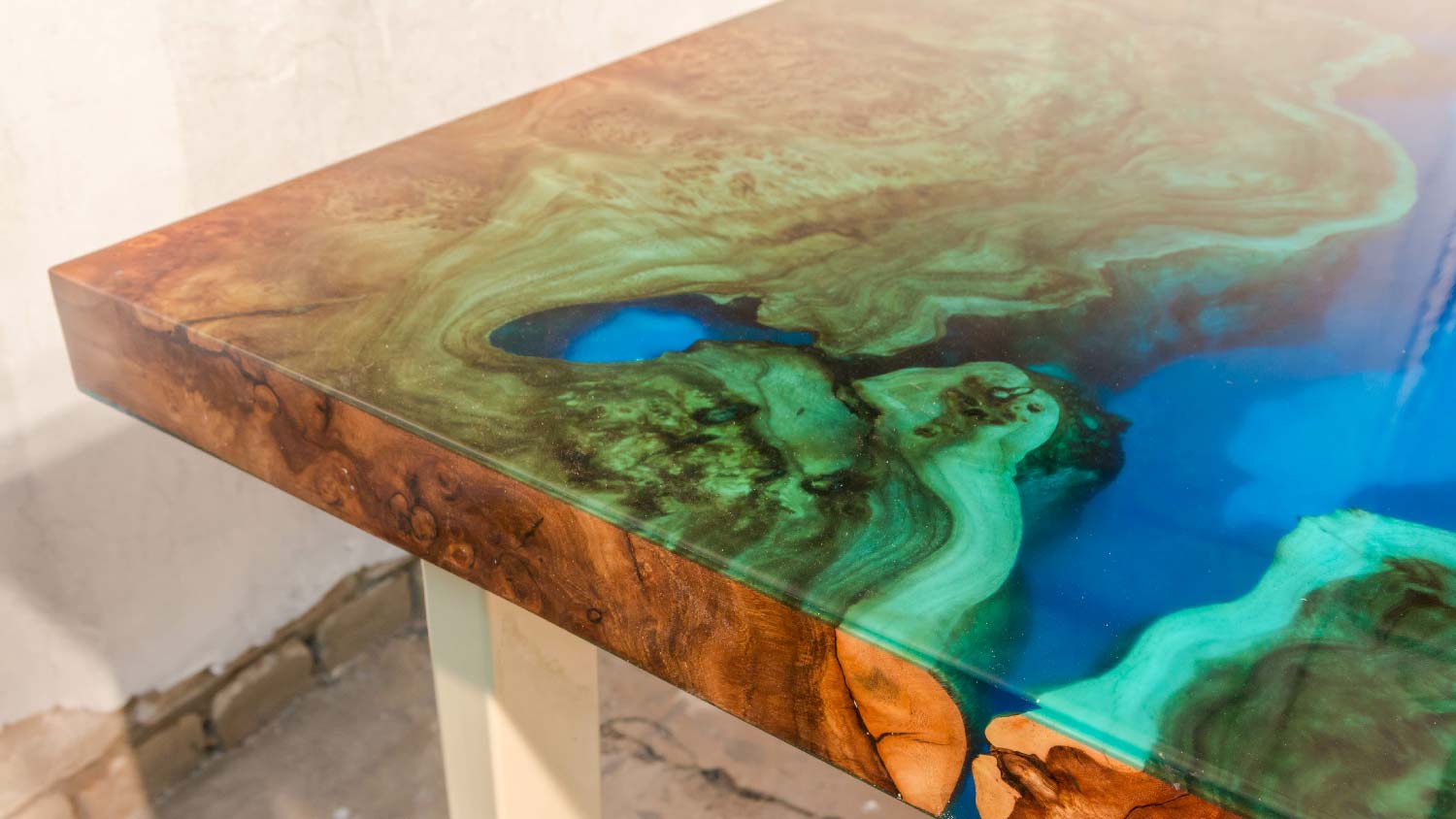
Epoxy countertops are installed on top of existing counters when you want to refinish them. The material is a mixture of resin and hardener that you mix and pour onto the surface. You can install epoxy counters on almost any countertop material, and it’s very cost-effective if you do it yourself.
| Pros | Cons |
|---|---|
| Non-porous | Stains can be permanent |
| Install on existing countertops | Only imitates other materials |
| Heat-resistant | Requires a precise DIY job |
Best for:
Those who want to upcycle their current counters
Remodeling your kitchen on a budget
DIYers who want to install their own countertops
Non-porous and moisture-resistant
Save money by refinishing your existing countertop
Heat-resistant up to 150 to 300 degrees Fahrenheit depending on epoxy quality
Can permanently stain from food or spills
Doesn’t look as great as the materials they imitate
DIY installation requires precision and timeliness

Granite countertops are a popular type of natural stone counters. Manufacturers quarry the material from the earth and later cut it into large blocks and then slabs. Next to marble countertops, granite is one of the most classic options for high-end kitchens.
| Pros | Cons |
|---|---|
| Beautiful appearance | Pricier option |
| Heat and scratch-resistant | Heavy |
| High ROI | Hard to repair |
Best for:
Luxury-style kitchens
Home cooks that expect to put a lot of hours in the kitchen
Those looking to make a long-lasting investment
Each slab is uniquely beautiful
Extremely heat and scratch-resistant
ROI of up to 75%
Costs significantly more compared to epoxy
The heavy countertop requires professional installation and solid cabinetry
Large damage is hard to repair
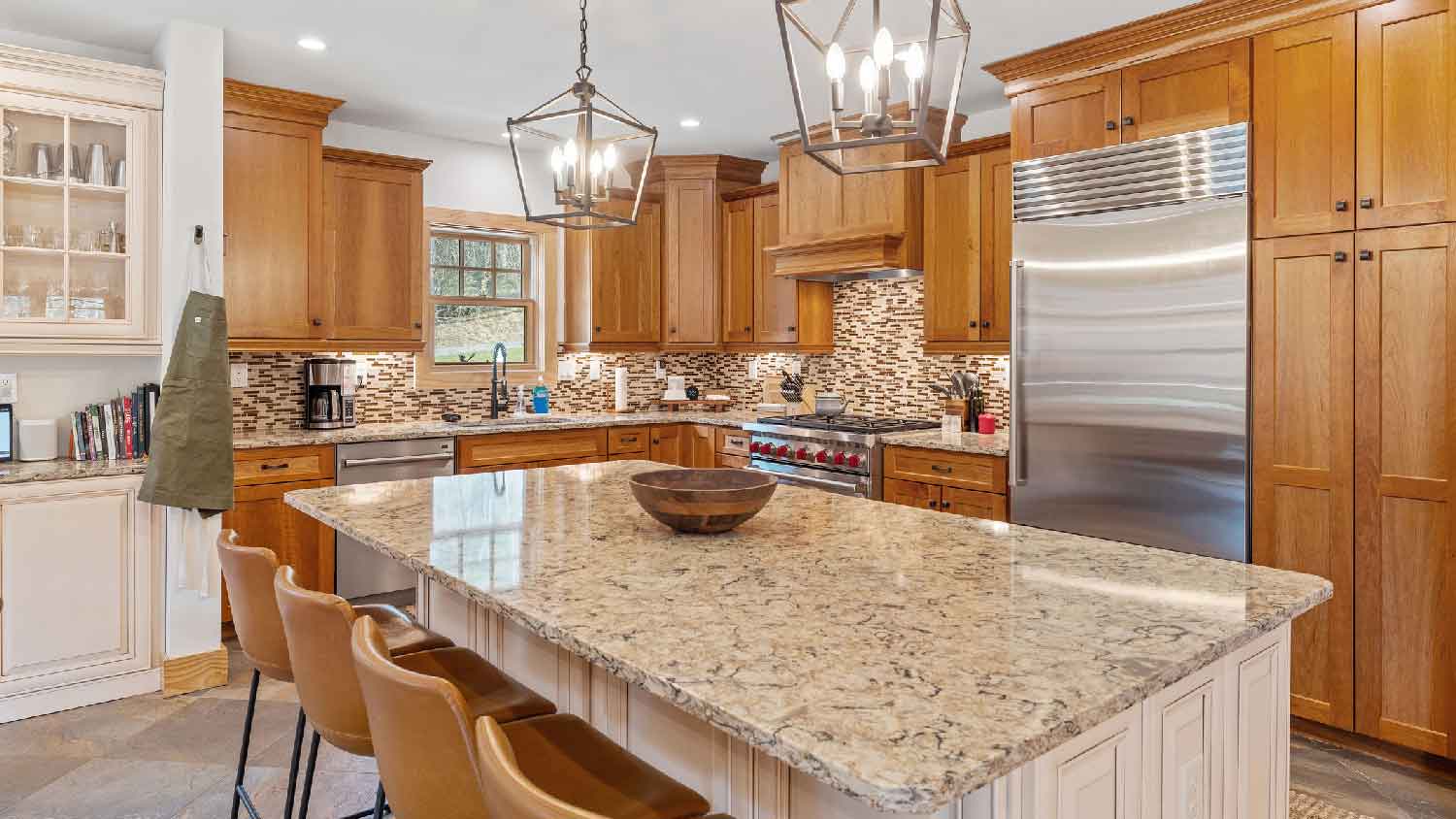
Here are some of the most important things to consider when comparing epoxy and granite countertops.
It’s hard to beat the luxurious appearance of natural stone, and granite is a timeless choice because of its beauty. Each granite slab is unique, and many people enjoy having a piece of nature inside their homes.
Epoxy can be a great alternative to natural stone countertops. There are epoxy kits and installation techniques that will help you emulate the look of natural stone, including granite. However, most people will know upon a closer look that your epoxy counters are imitation granite instead of the real deal.
There are more options and customization options for epoxy countertops compared to granite.
However, granite offers many choices. You can choose from white, black, blue, red, or gold granite and solid, marbled, or speckled designs. There are also honed or glossy options. Plenty of edging options are available, including the standard ones like bullnose, ogee, chiseled, and beveled. You can also opt for fancier edges like ½-inch ogee bullnose, ½-inch double bevel, and ½-inch knife.
When looking at the pros and cons of epoxy countertops, you’ll notice a great advantage: you have many design options. If you find the proper kit, you can make epoxy countertops of any shade or design. If you choose a granite-look epoxy counter, you can hand draw the veins precisely as you’d like them.
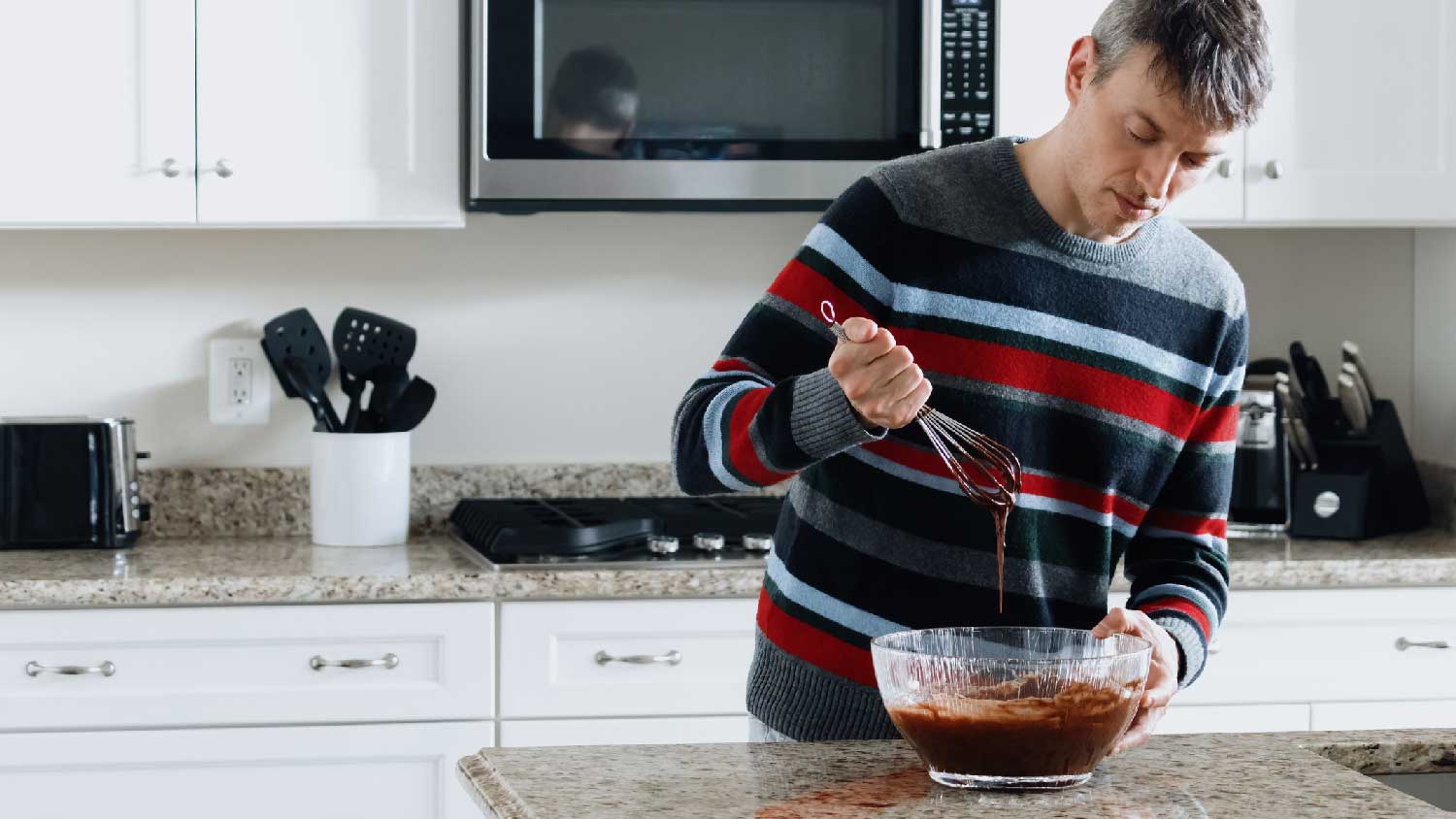
Granite countertops are very durable and can withstand years of wear and tear. The scratch-resistant nature of granite means that if you accidentally make a knife cut on the counter, the surface may not scratch. Also, this heat-resistant material can withstand up to 1,650 degrees Fahrenheit. This means if you put a hot pan directly on the counter occasionally, you won’t have any lasting damage.
Epoxy is less durable and can scratch easily. If you accidentally make a knife cut on epoxy, then there’s a chance that you could scratch or chip the surface. Furthermore, you should always use a trivet because it’s not heat-resistant. Epoxy counters can only withstand 150 to 300 degrees Fahrenheit, so placing your hot appliances on a hot pad is essential.
Heat damage from hot pots and utensils can leave unsightly marks and spots on your kitchen counter. Tile, granite, and stainless steel are more heat-resistant than wood or laminate. Prevent heat damage by letting pots cool on the stove and using trivets.
Granite countertops cost $50 to $200 per square foot, while professionally installed epoxy countertops cost $50 to $150 per square foot. You can save even more by DIYing your epoxy countertops, in which case your epoxy kit will run you between $100 and $350. This makes epoxy one of the best options for kitchen countertop ideas on a budget.
Granite countertops almost always require professional installation. The slab is hefty and requires careful and skilled handling. Plus, the weight of the slabs means that your cabinets may need extra reinforcement. Improperly installed granite counters can lead to cracks, large seams, and more. Avoid any issues by hiring a countertop contractor near you. If you decide to DIY the job, thoroughly prepare by learning all the ins and outs, including how to cut granite countertops.
On the other hand, you may have the chops to learn how to epoxy countertops. However, the process isn’t easy and requires you to work precisely, efficiently, and quickly. You’ll also need some artistic skill to paint the veins for stone-imitation surfaces. If you’re not confident in your epoxy skills or are sensitive to fumes, you should hand this job off to a pro.
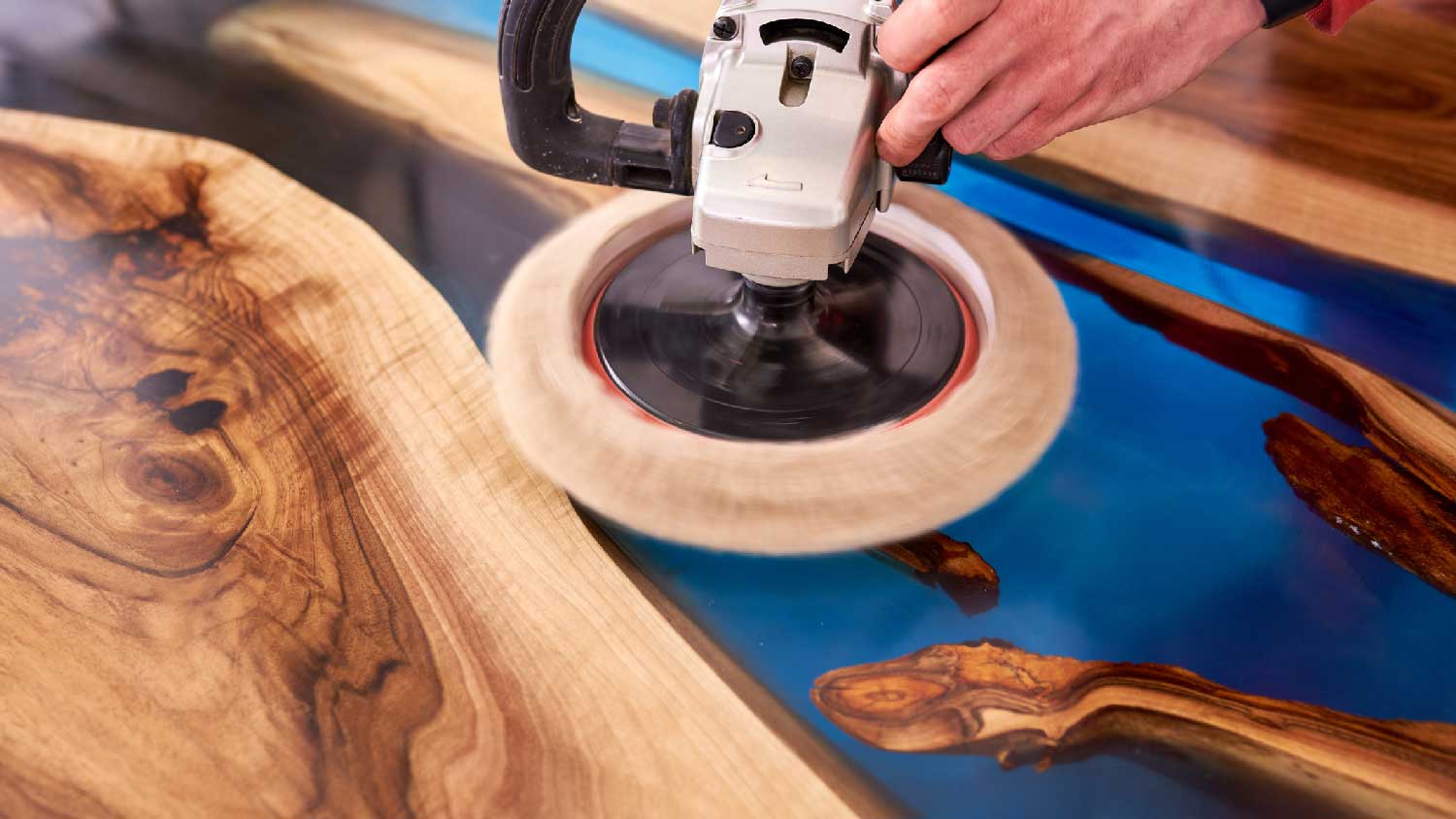
As long as you’re dealing with minor chips or cracks, you can usually DIY repairs for both granite and epoxy counters. For granite, you can use a color-matched epoxy repair kit. However, if you’re uncomfortable with the process, hire a pro so you don’t accidentally damage the natural stone surface. Fixing small cracks on epoxy countertops is easier in comparison because you can buff out most scratches with a polish paste and buffer.
Larger damage to your granite counters is rare since the stone is so durable. However, if you accidentally damage your counters and there’s a bad chip, crack, or more, you must call in a pro. Depending on the severity of the damage, it may or may not be repairable.
Both granite and epoxy counters require regular sealing. Doing it annually is good practice to maintain your counters in the best shape possible. You should use cutting boards and trivets on both surfaces, although granite is much more forgiving of mistakes.
You should use soapy, warm water and a soft cloth to clean both counter types. Clean up spills promptly for either countertop to avoid stains, and keep all acidic foods and liquids off granite counters to prevent etching.
A well-maintained granite countertop can last you 100 years or longer, while epoxy countertops last 10 years or longer. With such a vast difference in the length of life, it may make sense to go with granite if your budget allows. Over time, you’ll spend more reinstalling epoxy counters than simply investing in granite counters up-front.
While there are environmental impacts to granite quarrying, the long-lasting and recyclable nature of the stone makes it a more sustainable option when compared to epoxy. Since these counters can last a century with proper maintenance, you won’t have to dispose of old counters and install new ones multiple times throughout your lifetime. And when you’re done with these counters, you can repurpose or recycle them.
Epoxy countertops only last a decade or so, meaning you’ll need new ones reasonably soon. Volatile Organic Compounds are released during the installation process, and you can’t recycle these counters.
Granite counters offer a high ROI of around 75%, while epoxy doesn’t have a notable ROI. So if you’re trying to choose between these two options and plan to sell your house soon, going with granite might be a better choice.
The average cost to install countertops is between $1,850 and $4,450. Most materials, including granite, are the most expensive factor, with labor costs adding around $10 to $30 per square foot. On the other hand, epoxy is a cheaper material that requires skill and time to install, which is why its labor expenses are between $40 and $140 per square foot.
Regardless of the material, installing countertops is hard work. While installing your own modular granite countertops is possible, never try to DIY install large granite slabs yourself. The slabs weigh hundreds of pounds and require proper sealing, grouting, and leveling.
Similarly, epoxy countertop kits may be readily available, but the process is messy and difficult. If you don’t know what you’re doing, you may end up with a blotchy, bubbly, or uneven countertop.
It’s best to hire a pro to install your countertops, or you may spend more to fix them than you would have to get them installed professionally.
From average costs to expert advice, get all the answers you need to get your job done.

Kitchen islands are multipurpose workhorses in your kitchen. When looking to add one to your home, you should consider its size, materials, and its primary use in your home. Learn about the price of kitchen islands and their different features.

Discover the cost of installing laminate countertops, including how their size, material, and finish impact your total price.

If you’re looking to refinish your countertops, epoxy will make them shine for years to come. This guide will help you budget for epoxy countertop costs.

Figuring out which types of kitchen islands will fit your space and your usage habits can be challenging. Use our tips to zero in on your perfect design.
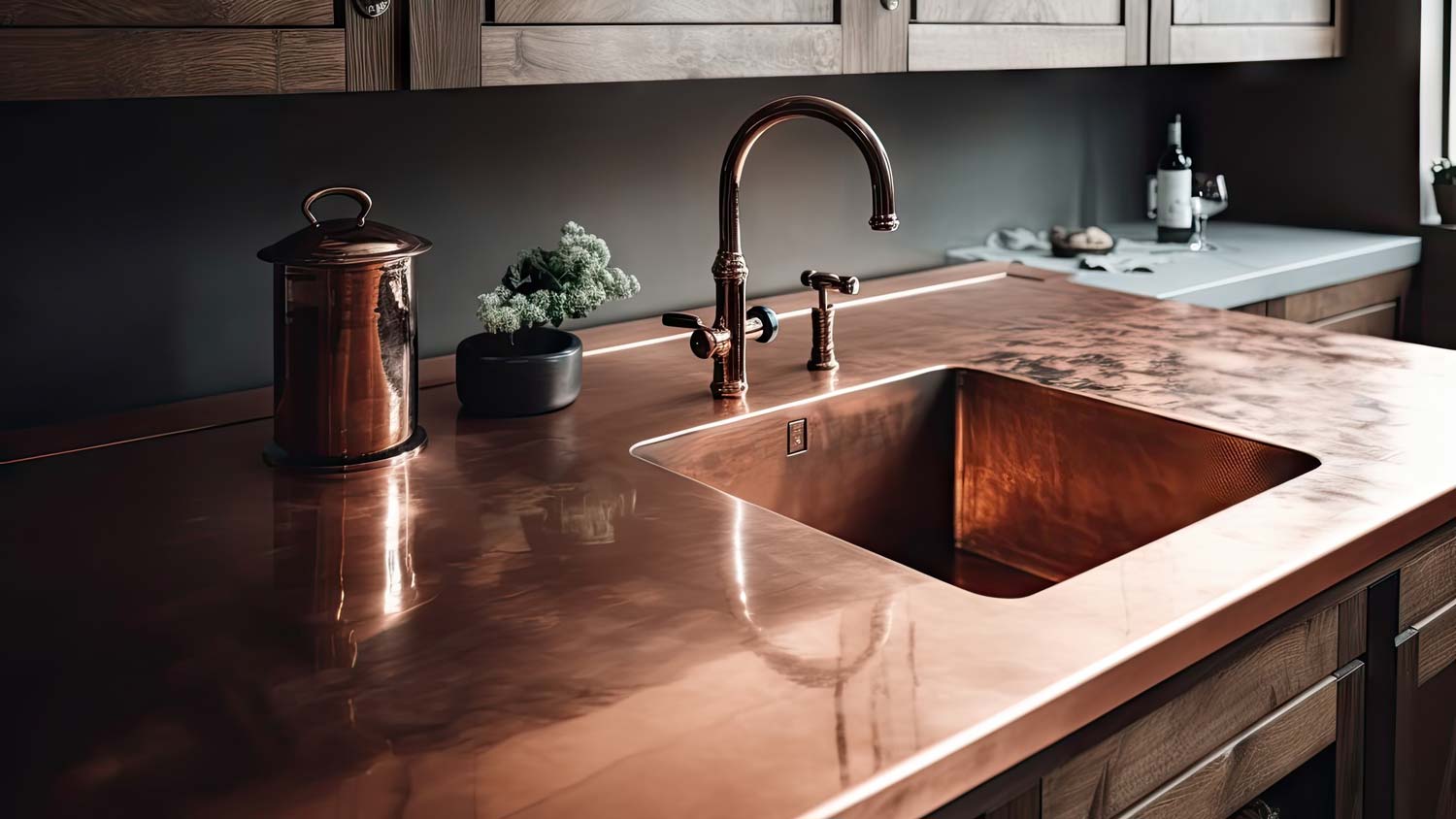
Discover the average copper countertops installation cost, key price factors, and expert tips to help you budget for your new kitchen upgrade.
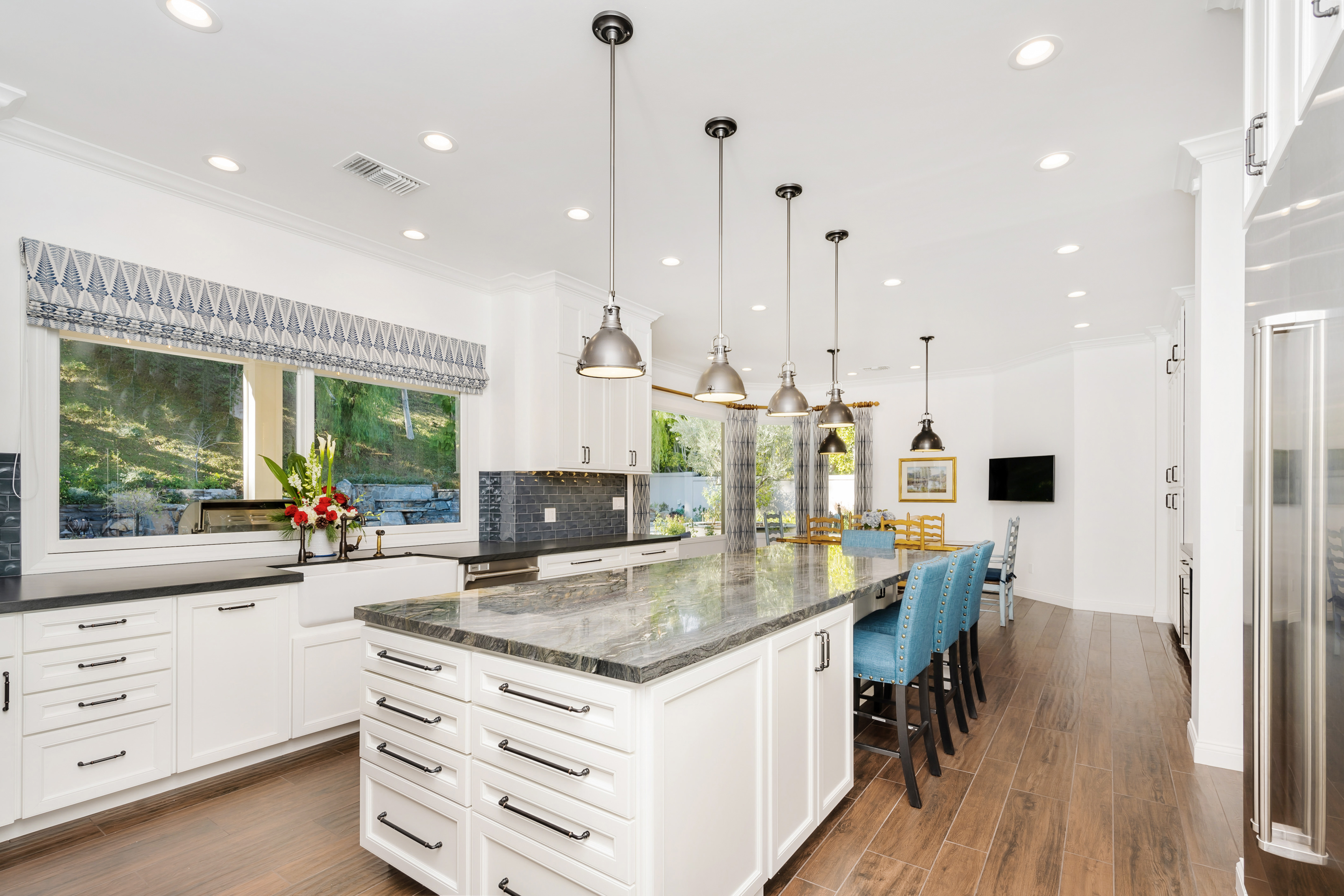
How much does granite weigh? Estimate the weight of granite countertops for any size and thickness with our quick and accurate calculator tool.